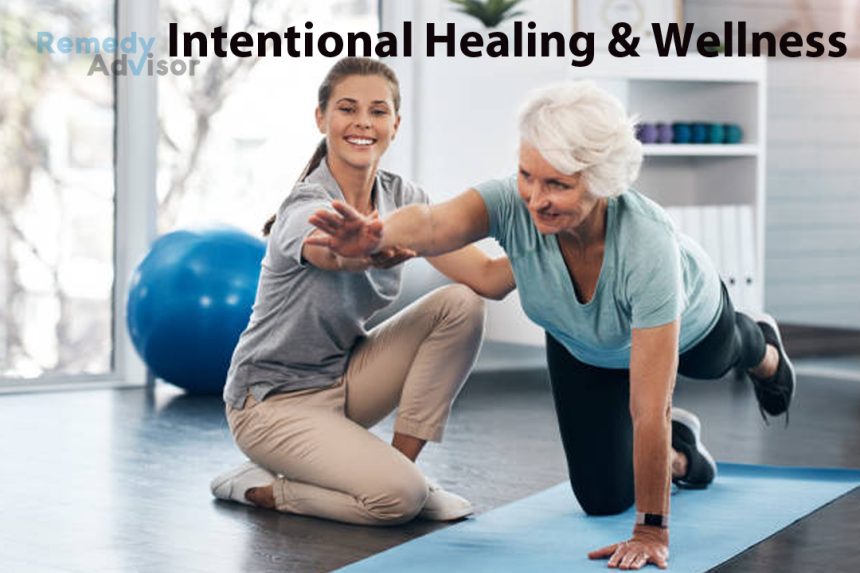To most people the word “healing” means doctors and drugs regaining health with the help of others. But the most powerful kind of healing is what we do for ourselves, by our own thoughts and actions, by the way we live.
This Intentional Healing is based on a conscious decision to maximize well-being. Instead of passively enduring the physical ravages of stress, suffering the consequences of bad health habits and allowing negative emotions to plague our days and nights, we…
- Tap into the powers that are naturally within us.
- Take control of our minds and bodies to use these powers to the maximum. If you’re in good health, Intentional Healing will help you stay that way.
If you’re ill, it can combine with medical care (if needed) to make you well.
Keys to healing
The twin pillars of Intentional Healing are mindfulness and self-regulation.
Mindfulness is becoming aware of what your mind is doing.
Self-regulation is harnessing the mind’s power to ease your body into a healthier state.
Most people go through life barely conscious of the thoughts and feelings that course through their minds. But many of these thoughts and feelings are destructive.
Examples: Worry anger and fear all tighten muscles, tax the circulation and trigger the release of stress hormones that in time take their toll on every system of the body.
Meditation
Mindfulness involves waking up to what’s going on in your mind, observing patterns of thought and patterns of feeling in order to change and control them.
The first step to mindfulness is a daily meditation exercise, setting time aside to stop, be still and listen to what’s going on within your mind. For 30 minutes each day…
• Sit in a quiet place, eyes closed
Sit in a quiet place, eyes closed, hands comfortably on your thighs. Take a deep breath and then breathe normally, counting each cycle of inhalation and exhalation up to 10. Do this three times.
• Focus your attention on your abdomen
Now focus your attention on your abdomen, how it rises and falls with each inhalation and exhalation.
- When thoughts enter your mind, simply observe them
When thoughts enter your mind, simply observe them without getting caught up in them. Let them pass. Then turn your attention back to your breathing.
• If you feel restless, bored or uncomfortable, observe these feelings, too.
Then, when your mind quiets, focus again on your breathing.
You may feel extremely relaxed and peaceful after a few minutes or you may not. There’s no right or wrong way to feel, the point of the exercise is simply learning to experience the present.
In the moment
Everyday life offers constant opportunities to practice mindfulness. Examples…
• When you eat
When you eat, slow down. Eat slowly and mindfully, to keep your digestive system in a relaxed condition. Be aware of the color and aroma of the food. Note the feeling of each mouthful, the changing subtleties of flavor and texture, the movement of your jaws, and the sensation of swallowing.
• When you wash the dishes
When you wash the dishes, be conscious of the way each plate and utensil feels, the sensation of water on your skin. Be aware of your thoughts in a detached way, and then return your full attention to the task at hand.
• When talking with others
When talking with others, pay complete attention. Erase judgments and reactions from your mind instead of planning your response, be silent and listen fully to what the other person has to say.
Learning to regulate your body
Health is a natural result when your body functions in a balanced way, neither too revved up nor too fatigued. We run into trouble when external pressures and events or our own feelings (particularly anxiety) disrupt the balance. That creates stress widely recognized as a villain in a host of illnesses, from eczema to backache to heart attack.
By learning to regulate your own body, you cease to be at the mercy of health-destroying stress. Whenever you wish, you can ease your body into a healthy balance.
• Relaxation

Relaxation is a critical skill. Many people find that regular practice of mindfulness makes them more relaxed and eases stress. Practice an exercise called complete breathing…
Sit in a straight-backed chair. Close your eyes and place both hands on your abdomen. Feel your hands raise as you inhale deep down into your abdomen, making it expand as if it were a balloon. Continue breathing in to fill your chest with air feel your chest muscles expand. Draw in more air so your shoulders rise slightly.
Release the breath, allowing it to flow smoothly out of the chest, and then slowly contract your abdomen to expel the rest of the air.
Repeat the cycle 10 times. Do three groups of 10 complete breaths.
• Healthy lifestyle
This is another important way to take control of your body. By exercising regularly, you reduce stress, strengthen your heart and circulatory system and enhance the activity of your immune system.
Brisk walking, at least 20 minutes, four times a week, is a sensible, healthy exercise schedule.
The foods you eat have a significant effect on how your body functions. Choose a diet that will promote the health of your heart, arteries and digestive system.
Build your diet around fresh fruits and vegetables, and unprocessed foods rich in carbohydrates and fiber.
- Keep animal fats to a minimum.
- Reduce your intake of salt.
- Drink lots of water.
- Have modest-sized meals
Create a healthy life
Our attitudes have a constant impact on our bodies. Greed, selfishness and contentiousness generate relentless stress. But when we resolve to live at peace with the world and other people, we create for ourselves an environment that promotes healing. Strive for…
• Contentment.
This mental attitude finds satisfaction in what life gives you. This doesn’t mean abandoning your goals, but being patient with the pace of progress, enjoying each day.
• Simplicity.
This requires you to know the difference between what you want and what you need. The simpler you make your life, the less turmoil you will cause yourself.
• Honesty
Be honest with yourself and all around you.
• Harmlessness
Abstain from actions and words that injure others. Make a conscious choice to nurture feelings of goodwill toward everyone.
• Solitude
Only when outside noise quiets down can you listen to your mind and body. Spend a half hour a day alone in a quiet room or out in nature. Give yourself space for reflection it’s as necessary for healing as food or sleep.







